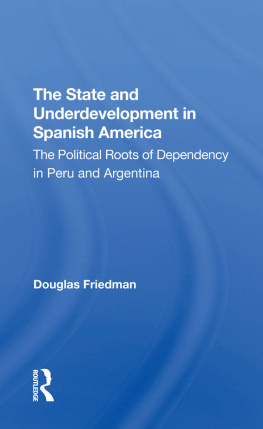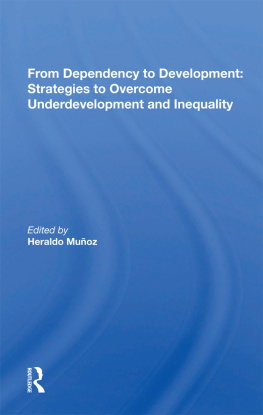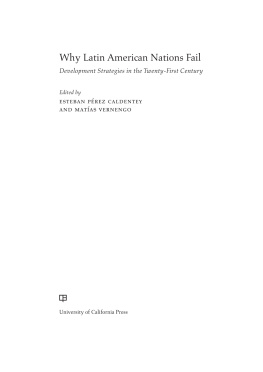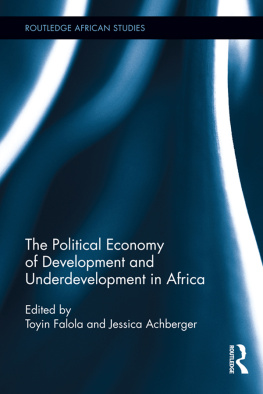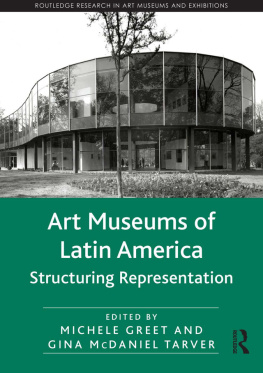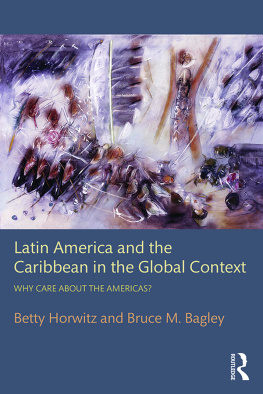Lawrence E. Harrison - Underdevelopment is a State of Mind: The Latin American Case
Here you can read online Lawrence E. Harrison - Underdevelopment is a State of Mind: The Latin American Case full text of the book (entire story) in english for free. Download pdf and epub, get meaning, cover and reviews about this ebook. year: 2000, publisher: Madison Books, genre: Politics. Description of the work, (preface) as well as reviews are available. Best literature library LitArk.com created for fans of good reading and offers a wide selection of genres:
Romance novel
Science fiction
Adventure
Detective
Science
History
Home and family
Prose
Art
Politics
Computer
Non-fiction
Religion
Business
Children
Humor
Choose a favorite category and find really read worthwhile books. Enjoy immersion in the world of imagination, feel the emotions of the characters or learn something new for yourself, make an fascinating discovery.

- Book:Underdevelopment is a State of Mind: The Latin American Case
- Author:
- Publisher:Madison Books
- Genre:
- Year:2000
- Rating:5 / 5
- Favourites:Add to favourites
- Your mark:
- 100
- 1
- 2
- 3
- 4
- 5
Underdevelopment is a State of Mind: The Latin American Case: summary, description and annotation
We offer to read an annotation, description, summary or preface (depends on what the author of the book "Underdevelopment is a State of Mind: The Latin American Case" wrote himself). If you haven't found the necessary information about the book — write in the comments, we will try to find it.
Originally published in 1985, Underdevelopment Is a State of Mind was one of the first studies to examine Latin Americas rocky development as cultural, rather than colonial, byproduct.
Lawrence E. Harrison: author's other books
Who wrote Underdevelopment is a State of Mind: The Latin American Case? Find out the surname, the name of the author of the book and a list of all author's works by series.
Underdevelopment is a State of Mind: The Latin American Case — read online for free the complete book (whole text) full work
Below is the text of the book, divided by pages. System saving the place of the last page read, allows you to conveniently read the book "Underdevelopment is a State of Mind: The Latin American Case" online for free, without having to search again every time where you left off. Put a bookmark, and you can go to the page where you finished reading at any time.
Font size:
Interval:
Bookmark:
Underdevelopment
Is a State of Mind
Is a State of Mind
The Latin American Case
Updated Edition
Lawrence E. Harrison

Copyright 1985 by The President and Fellows of Harvard College
New Introduction copyright 2000 by Lawrence E. Harrison
All rights reserved.
No part of this book may be reproduced in any form
or by any electronic or mechanical means, including
information storage and retrieval systems, without written
permission from the publisher, except by a reviewer who
may quote passages in a review.
Published by Madison Books
An imprint of The Rowman & Littlefield Publishing Group, Inc.
4501 Forbes Boulevard, Suite 200, Lanham, Maryland 20706
Estover Road
Plymouth PL6 7PY, United Kingdom
Distributed by National Book Network
The hardback edition was previously catalogued by the Library of Congress as follows:
Harrison, Lawrence E.
Underdevelopment is a state of mind.
Bibliography: p.
1. Latin AmericaEconomic conditions1945
2. Economic developmentSocial aspects 3. Culture.
4. Economic developmentPsychological aspects.
I. Title
HC125.H384 1985 330.98'0038 85-9117
ISBN 1-56833-147-9 (cloth : alk. paper) ISBN 978-1-56833-147-8
 The paper used in this publication meets the minimum requirements of American National Standard for Information SciencesPermanence of Paper for Printed Library Materials, ANSI/NISO Z39.481992.
The paper used in this publication meets the minimum requirements of American National Standard for Information SciencesPermanence of Paper for Printed Library Materials, ANSI/NISO Z39.481992.
Manufactured in the United States of America.
I am indebted to a large number of people who have contributed to the realization of this book, principally by criticism but often with their encouragement.
Several have focused on individual chapters: Robert Angyal, Arturo Cruz, Jack Harris, Eduardo Lizano, Toms Pastoriza, Len Tenembaum, and Bernardo Vega. Several others have read the entire book and provided me with helpful comments: Shirley Christian, Luigi Einaudi, Amy Firfer, Georgie Anne Geyer, James Goodsell, Neil Isaacs, Annik LaFarge, Michael Novak, Lawrence Pezzullo, Carlos Rangel, Reese Schonfeld, Michael Scully, Francis X. Sutton, and Sidney Weintraub.
I am particularly indebted to the Center for International Affairs at Harvard University, which provided me with an ideal setting for writing the book for the better part of two years. The comments and encouragement of Samuel Huntington and Dwight Perkins were of particular importance. Evelyn Brew did a magnificent job in typing the manuscript. Chet Haskell played a key role in the Centers decision to publish the book, and Virginia Livingston skillfully shepherded the manuscript through the publishing process. And it was the Center that located Nancy Macmillan to do her superb job of editing.
I am above all indebted to Jorge Domnguez, who studied the entire manuscript and whose scholarly insights, criticisms, challenges, and encouragement were invaluable.
Finally, I owe a special debt to my wife, Polly Fortier Harrison, whose decision in 1971 to pursue graduate work in anthropology, whose subsequent professional career in development anthropology, and whose insightful comments on the manuscript have all played an important part in the evolution of my thinking on the relationship between culture and development.
Not all of the people mentioned above agree with everything the book says. I alone bear the full responsibility for that.
Lawrence E. Harrison
To Polly, Julia, Beth, and Amy
Underdevelopment is not just a collection of statistical indices which enable a socio-economic picture to be drawn. It is also a state of mind, a way of expression, a form of outlook and a collective personality marked by chronic infirmities and forms of maladjustment.
Augusto Solazar Bondy
A Peruvian Intellectual
It is a clich, but it is worth repeating: The world looks vastly different in 1999 from the way it looked in 1985, when Underdevelopment Is a State of MindThe Latin American Case was first published. And so does Latin America.
The Soviet Union still existed in 1985, although Mikhail Gorbachevs rise to power in that year would soon lead to both the end of the Cold War and the disintegration of the USSR. Economic distress associated with the oil-price shocks and the debt burden brought Latin America to a crossroads that would lead to the supplanting of military governments by elected officials in all countriesincluding Pinochets Chile and Sandinista Nicaraguaexcept Cuba. That same crossroads led to the displacement of inward-looking, protectionist, and often statist economic policies by outward-looking free market policies. And the same crossroads substantially spelled the end of the mistrustful and conflictive United States versus Latin America dumbbell relationship that had dominated the Hemispheric dialogue during the sixties, seventies, and a good part of the eighties.
Those decades were the heyday of dependency theorythe near-dogma that the Third World, Latin America in particular, was exploited by First World imperialism, above all Yankee imperialism, through the world market and the multinational corporations headquartered in the First World. Not only did this explain the relative poverty of the Third World. It also explained authoritarianism in Third World politics: The dictators were allegedly installed and supported by the imperialists in collusion with their Latin American bourgeois lackeys. The imperialists were also engaged in a campaign to perpetuate the privilege of their bourgeois lackeys and thwart the aspirations of the masses for social justice. The Sandinista anthem captured the emotional intensity of the dependency victims:
Lucharemos contra el Yanqui, enemigo de la humanidad!
(We will fight against the Yankee, enemy of humanity!)
A decade after Underdevelopment Is a State of Mind was published, Mexico, among the most stridently dependencista and anti-Yanqui countries in the region, would be locked in an embrace with the United States and Canada through the North American Free Trade Agreement (NAFTA). And the president of Brazil would be Fernando Henrique Cardoso, formerly a For many years, dependency theory was the dominant interpretation of Latin Americas condition in the Latin American Studies Association, the organization of U.S. Latin Americanist scholars, and contrary views were often treated with intolerance.
But today, dependency theory is dead. South Korea, Taiwan, Hong Kong, and Singapore embraced the world market and foreign capital and, far from being exploited, vaulted from the Third World to the First World in three decades, and there they remain, even after the Asian Crisis, from which they have recovered far more rapidly than most observers expected. Authoritarianism, poverty, and injustice were, after all, chronic in Latin America long before the United States became involved in the region. Social injustice in Latin America, as measured by inequitable income distribution, is among the most extreme in the world to this day.
Largely unnoticed in U.S. academic circles, an inward-looking theory that focuses on cultural values and attitudes, consistent with the thesis of Underdevelopment Is a State of Mind, may gradually be filling the explanatory vacuum left by dependencys collapse. Recently, Latin America has taken the lead in articulating the theory and contriving initiatives to convert the theory into actions designed not only to accelerate economic growth but to fortify democratic institutions and promote social justice. But culture theory also has advocates in Africa and Asia.
Next pageFont size:
Interval:
Bookmark:
Similar books «Underdevelopment is a State of Mind: The Latin American Case»
Look at similar books to Underdevelopment is a State of Mind: The Latin American Case. We have selected literature similar in name and meaning in the hope of providing readers with more options to find new, interesting, not yet read works.
Discussion, reviews of the book Underdevelopment is a State of Mind: The Latin American Case and just readers' own opinions. Leave your comments, write what you think about the work, its meaning or the main characters. Specify what exactly you liked and what you didn't like, and why you think so.


